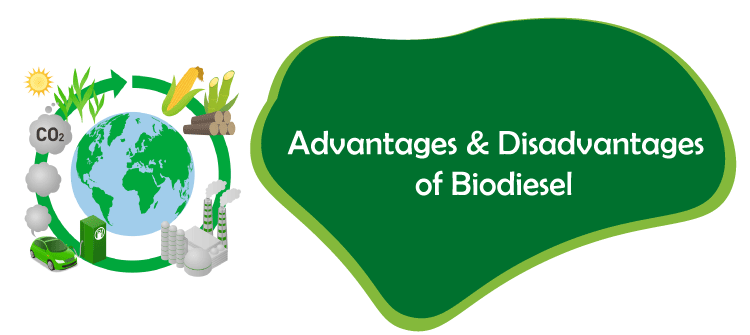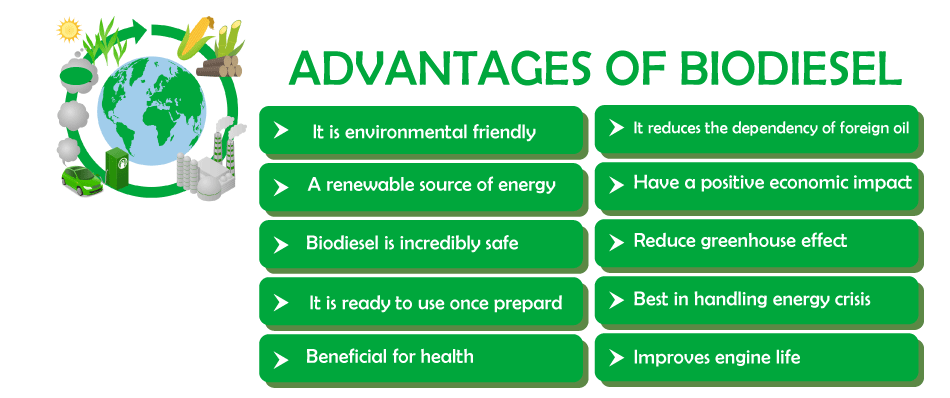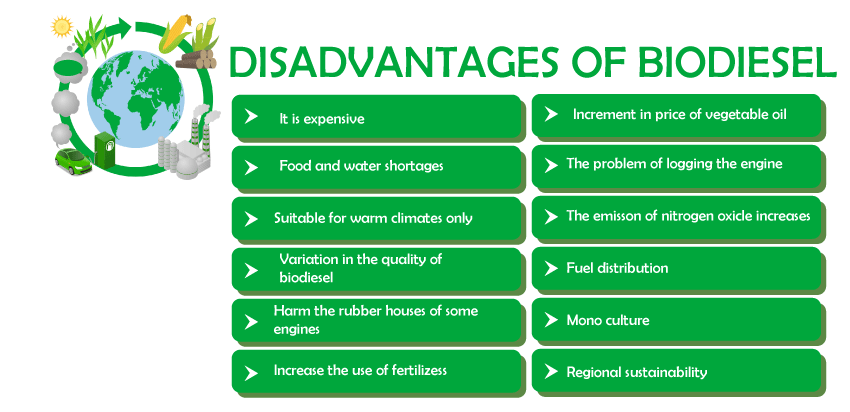Advantages and Disadvantages of BiodieselEverything, including human, animals, machinery, and otherworldly or non-materialistic things, need some power or energy to do work or make it functional. Energy is the key factor for a process to occur and produce heat, life, power, move objects, or produce electricity. The energy is generated from the substance called fuel. Fuel is the thing that stores the energy, and burning or utilization of fuel produces energy. In early times humans consumed energy as compared to now has been multiplied by 100 times. Fossil fuels are the major producer of energy buried under the earth for crores of year, utilized by humans to ease their work. 
Fossil fuels are of two types of energy sources: Renewable or Non- renewable source of energy. Examples of renewable sources of energy: Solar energy, wind energy, geothermal energy, biomass energy, and hydropower Examples of Non-renewable sources of energy: Coal, petroleum, natural gas, metals, non-metals, and groundwater. Fuel is the food of machinery that makes them run as (fuels) are substance that reacts with other substance and produces chemical and nuclear energy. Fuels are a major part of society as they rapidly adapt during industrial evolution. Fuels were cheap and efficient. That's why they are widely used but are also attributed to pollution. Non-renewable fuels are on the verge of ending as they are limited in nature and can't be created by humans. But renewable sources are now highly adopted by people as they can be regenerated, such as biofuels. Biofuels are creative or derived from biomass, including biological material (trees, cons, agricultural waste, grass, or gas) that can easily replace conventional fossil fuels. Types of biofuels are Ethanol, biogas, and biodiesel. Now we are going to discuss biodiesel in this article. Biodiesel is a type of diesel made from vegetable oil instead of chemicals. It is a biodegradable fuel domestically manufactured from animal fats, recycled restaurant waste, and vegetable seed oil, and as it can be recycled, it is also called "green diesel". It is the best alternative to diesel which create pollution. "Biodiesel is a biofuel produced straight from animal oil/fat, vegetable oil, waste cooking oil, agriculture waste, fat, and waste cooking oil. This combustible fuel is made by alcohol (methanol) with vegetable oil or oil seeds." History: Biodiesel was invented by Rudolph Diesel in 1890 during an experiment using vegetable oils in diesel engines for agriculture. At that time petrol diesel was not available, but after that, petrol-diesel came, but due to limited resources, they remain at the edge of extinction. In the 1930s, a research experiment was conducted in Belgium in which vegetable oil was converted into compounds called fatty acid methyl esters from where modern diesel came out. Trans-esterification is the process that produces biodiesel on which animal fats, plant oil, and recycled cooking oils are used. Biodiesel's quality depends on the world's ability to produce these renewable feedstocks and keep it competitive with petroleum. Biodiesel is used in normal diesel engine as a supplement to petro-diesel that has no sulphur virtually and help in reducing the emission of hydrocarbon, carbon monoxide, ozone formation, and nitrogen oxide. The color of biodiesel varies from golden to dark brown. It has a flash point (more energy needed to make it burn) 130oC higher than the petro-diesel (64o C) or gasoline (-45o C). Substances in biodiesel include oil seed crops, animal fats, waste oil, and algae. Oil seed crops are Neem oil, mustard, soybeans, mahua, jatropha, camelina, rice bran oil, camelina, sunflower, rapeseed, canola, Karanja, sunflower, etc. Used and waste oil: In Greece, waste oil is collected from restaurants. Animal waste: animal fat, animal waste, feedstocks. Algae: Microalgae as they are high in oil content and help in rapid biomass production. Production of biodieselThe production of biodiesel is a simple chemical process named transesterification in which glycerine is separated from vegetable oil or fat, and two by-products are left behind, such as glycerine and methyl. The chemical name of biodiesel is methyl ester, whereas glycerine is commonly used in various items like creams, soaps, and other beauty products. Some methods of biodiesel are as follows:
Advantages of biodieselBiodiesel has a tremendous advantage over other fuels used in daily use such as: 
It is environment friendly Biodiesel has passed all the emission testing thresholds under the Clean Air act. It keeps the environment safe and secure as when it gets spilled, it's easy to clean and has less environmental damage as it emits 11% lower carbon monoxide. A renewable source of energy Biodiesel is made by blending organic or natural products (including waste vegetable oil, used cooking oil, animal fats, crop seeds, and other organic waste) that will not be distinct in coming years and could not cause pollution like petrol and diesel. Biodiesel is incredibly safe. Compared to other fossil fuels during burning, biodiesel has proved to be a non-toxic fuel producing lower emissions that restrict the risk of respiratory illness. It has a lower flash point than conventional diesel because it ignites at higher temperatures. It is less risky to ignite accidently, making it easy to transport and store and much safer. Like sugar, biodiesel is degradable and ten times less toxic than table salt. It is ready to use once prepared. Petroleum, diesel, coal tar, methane gas, and other toxic elements can't be reached directly by humans for use. Instead, they fetched through crude oil extracted from underground. These are the by-product of the crude oil refined in large refineries where they release many chemical compounds (benzene and butadiene) harmful to plants, animals, and humans. But biodiesel refineries are less harmful than petroleum as they use natural products to extract and make biodiesel that releases less toxic chemicals to the environment. Once extracted, it is ready to use in day-to-day life. Beneficial for health Compared with petroleum products, biodiesel is quite efficient in producing less toxic pollutants. It keeps the air, water, and land less polluted and rescues thousands of people's health daily. It reduces the dependency on foreign oil. To fulfill the petroleum consumption in the country, India must import it from countries like Iraq, Iran, and others. Still, biodiesel can be extracted from home-based products within a country. It instantly can't fulfill all the requirements but can reduce the fuel extinction issue to a great extent. A country doesn't need to depend on foreign countries for fuel if it starts producing biodiesel indigenously. This solution can also balance the country's economy and reduce geopolitical tensions. Have a positive economic impact Preparation or making of biodiesel includes organic material, i.e., locally grown crops that increase the demand for farming and yield. It makes thousands of low-educated or illiterate people employed in the biofuel production plant. The best part is it doesn't affect the health of workers or humans and reduces expenses on healthcare products. Reduce greenhouse effect Burning biodiesel or biofuel emits less CO2 than petroleum because biofuels are carbon neutral. Fossil fuel, when burnt, raise the temperature of the environment and cause global warming. When biofuel is burnt, it emits carbon dioxide into the atmosphere that plants in the photosynthesis process further take from the atmosphere. This help maintains the level of carbon dioxide in the atmosphere. Biodiesel emission is 74% lower than petroleum, which helps in reducing the greenhouse effect. Best in handling energy crisis Due to population and increased demand for everything, countries worldwide can face severe energy crises. This could create major issues among countries and be a reason for world war 3. This can be prevented by producing biodiesel that reduces the energy crisis and balances the country's economy. Improves engine life As biodiesel is an artificial organic fuel, have fewer chances of the tincture, making the engine work smoothly. Biodiesel increases the fuel cetane number and fuel lubricity, effectively improving engine life and making vehicles run smoothly on the road without creating environmental pollution. Disadvantages of biodiesel
It is expensive A study on biofuels has proved biodiesel is 70%-130% more costly than petrol and diesel because it depends on the crops sued in this. The process used in preparing biodiesel depends on feedstock inputs, which are more expensive than petroleum. The price of biofuel will continuously exceed if customers' demands remain low. Food and water shortages As we know, biodiesel fuel is produced from plants and crops depletion, and to cover this, crop production should be increased, but an increase in crop production can threaten local water suppliers. Crops or plants used to produce biodiesel are water-intensive plants, such as soy, that can deplete many water sources. Suitable for warm climates only Being an environmentally friendly fuel, biodiesel is unsuitable for cold climates. Researchers discovered that biodiesel changes its state at low temperatures; it converts into a gel substance that makes it difficult to use as a fuel. Cold climate drivers couldn't be able to use it as a fuel source as it's incompatible in cold regions. This problem can be reduced by blending biodiesel with winterized diesel fuel. Variation in the quality of biodiesel The quality of biodiesel depends on the variety of crops used in its production. The amount of crop and vegetable oil can create variations in biodiesel quality. Harm the rubber houses of some engines With clogging, problem biodiesel can also damage the rubber houses of some engines. Increase the use of fertilizers With the demand for biodiesel, its production also increases, which needs crops. Growing crops need more fertilizers, resulting in land pollution and soil erosion. Instead of chemical fertilizers, farmers should take organic farming seriously that fight against soil erosion and land pollution. Chemical fertilizers are costly, but farmers can make organic fertilizers. Increment in the price of vegetable oil Biodiesel production needs vegetable oil, which may increase the demand & price of vegetable oil in some countries. A good backup plan is required to solve this problem. The problem of clogging the engine Being a biodegradable tool, biodiesel can clean the dirt from the engine, but that cleaned dirt is further collected in the fuel filter and create the problem of clogging it. The emission of nitrogen oxide increases Using biodiesel (B100) will increase nitrogen oxide (NOx) emission by about 10-30% relative to diesel fuel, but with B20 biodiesel, there is hardly any nitrogen oxide emission. Nitrogen oxide emission depends on the type of biodiesel feedstock and engine technology. The major nitrogen oxide emission occurs with highly unsaturated fuels, including rapeseed, soap stock-based, and soybean. Fuel distribution Biodiesel is less distributed than petroleum diesel, so its distribution process needs a boost. For this purpose, infrastructure should be developed so that the population can adopt it as the primary source to run the engine. Monoculture This is a major drawback for land erosion due to land losing fertility. This farmer grows the same kind of crop again and again rather than producing a different crop. It reduces the vitamins and minerals in the soil because one kind of crop takes all of them at once, and repetition makes them nil in the soil and reduces the quality of the crop too. Regional sustainability Only some regions are suitable for the production of crops required in the production of biodiesel. Crops can be imported, adding transportation charges which increase production costs. Conclusion: In different regions, especially in warm regions, biodiesel will be more accessible and affordable. After evaluating its advantages and disadvantages, it can be concluded that biodiesel is a sustainable fuel source. It is used as an alternative fuel source for automobiles and other vehicles throughout the world. According to the report, till now, the United States has been the leading producer of biodiesel, and after that, Brazil, Indonesia, China, Germany, France, Thailand, Argentina, Netherlands, Spain, and others. Biodiesel is a vital replacement for petroleum diesel without any harmful results.
Next TopicAdvantages and Disadvantages of Forests
|
 For Videos Join Our Youtube Channel: Join Now
For Videos Join Our Youtube Channel: Join Now
Feedback
- Send your Feedback to [email protected]
Help Others, Please Share










